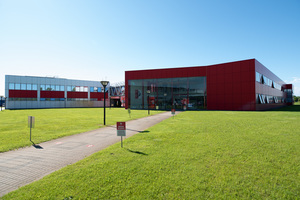

|
Edward Lowton
Editor |


|
Overcoming emissions challenges in combustion technology
26 February 2025
OVERCOMING EMISSIONS challenges in the combustion technology industry is a key focus for manufacturers as environmental regulations tighten and the demand for clean energy increases. In this editorial, Graham Barker, sales and service director at Riello Burners in the UK, examines how the combustion research sector is tackling the problem of reducing nitrogen oxides (NOx) and carbon dioxide (CO2) emissions through innovation in burner technologies.

This has been driven by multiple factors, including stricter emissions regulations, the integration of combustion systems into renewable energy grids, and the need for more affordable and efficient combustion technologies.
Shifting from traditional combustion systems to low-emission technologies
One of the main challenges faced by the combustion research industry is transitioning from traditional combustion systems to more advanced, low-emission burners. Historically, the combustion of fossil fuels - oil, gas, and coal - has been essential to sectors like energy production and transportation.
However, these methods are a significant source of NOx and CO2. To address this, the industry has focused on developing low-NOx burners and combustion systems that improve energy efficiency while lowering emissions. Research has expanded into alternative fuels such as biofuels and hydrogen, which are key to reducing the carbon footprint of combustion.
Innovation in burner technologies
Facilities such as Riello’s Combustion Research Centre (CRC) have been at the forefront of burner technology innovation. Located in Italy, the CRC is one of the largest burner testing facilities globally, where products undergo rigorous testing to meet regulatory standards.
Through its state-of-the-art testing infrastructure, the CRC has contributed significantly to developing high-performance, low-emission burners. For example, Riello has been pioneering research into hydrogen-compatible burners, which burn hydrogen instead of fossil fuels. Hydrogen combustion produces water vapor instead of CO2, offering a clean alternative to traditional combustion processes. The CRC’s investment in such technologies ensures that their burners are ready to be integrated into the renewable energy grids of the future.
Adapting to stricter regulations
Another challenge for the combustion research industry is keeping up with the increasing stringency of emissions regulations. Governments across the globe are introducing tougher rules on NOx and CO2emissions to mitigate climate change and improve public health.
As a result, burner manufacturers and researchers must continually innovate to ensure compliance. Testing centres like Riello’s CRC are essential for this, as they allow for real-world simulations that test burners under extreme conditions, such as using our climate controlled test chamber, to ensure they are not only efficient but also environmentally responsible.
Moreover, the CRC plays a crucial role in OEM burner matching, which ensures that industrial clients get the exact burner technology required for their specific operations. This customisation is vital because no single burner design can meet the needs of all industrial sectors, and specialised applications often require fine-tuning to balance emissions control and operational efficiency.
Addressing the cost barrier and training the workforce
The high cost of implementing advanced combustion technologies is another hurdle for the industry. Reducing these costs is essential for making low-emission burners more accessible and encouraging widespread adoption.
This is an area where research and development (R&D) play a pivotal role. By improving reaction kinetics, combustion modelling, and flame propagation studies, researchers are making strides in lowering the costs associated with burner technologies, making them more viable for a broader range of industries.
In parallel, the industry faces a shortage of skilled workers who can handle the complexities of new combustion systems. Facilities like the Riello CRC address this by providing comprehensive training through the Riello Training Academy, which ensures that the next generation of combustion engineers is well-equipped to manage and operate advanced low-emission burners. This training not only strengthens the workforce but also helps ensure the optimal performance of installed systems worldwide.
A sustainable future through combustion innovation
As the world shifts towards cleaner energy solutions, the combustion research industry must continue to innovate. By investing in R&D, developing affordable technologies, and adhering to global emissions regulations, the industry is playing a pivotal role in creating a future where high-performance combustion and environmental sustainability coexist.
Combustion research centres like the Riello CRC will remain critical in driving this progress, enabling the widespread adoption of cleaner, more efficient burners that meet the world’s pressing energy and environmental needs.
Overcoming emissions challenges in combustion technology is a multifaceted endeavour. Through continuous innovation in burner technology, adherence to regulations, and a focus on affordability and workforce development, the industry is steadily paving the way toward a sustainable energy future.
- Premix burners now up to 3MW
- Premix burners now in outputs to 3MW
- Riello announces continuation of CIBSE-accredited CPD courses
- Riello extends burner range
- Burner range extended
- Riello offers premix burners up to 3MW
- Website updated
- Low NOx burner
- Monobloc burner range extended
- Riello premix burners improve heating performance at Scottish site
- No related articles listed



















